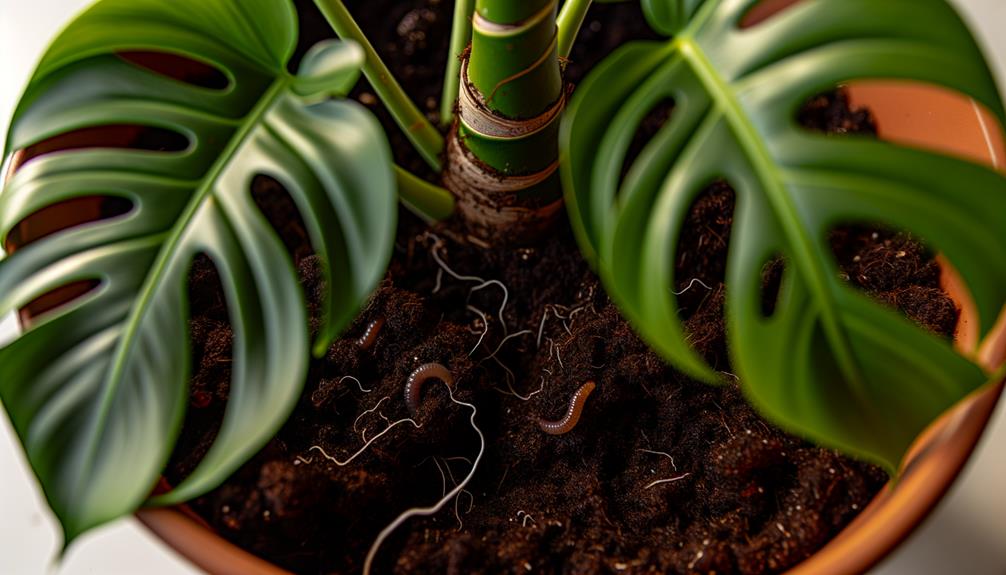Are Earth Worms in Monstera Deliciosa Beneficial? Explain!
Incorporating earthworms into the soil of your Monstera deliciosa can enhance soil health by improving structure, aeration, and nutrient availability. Earthworms decompose organic matter into nutrient-rich castings, which contain essential nutrients like nitrogen, phosphorus, and potassium.
This process boosts microbial activity and creates tunnels that mix soil layers, enhancing water drainage and preventing root rot. However, overpopulation of earthworms can disrupt root systems, compact soil, and alter nutrient balance.
Regularly monitor soil health and consider factors like soil moisture and composition to support a thriving environment. Stay tuned to understand more about balancing these factors effectively.

Key Takeaways
- Earthworms can benefit Monstera Deliciosa by improving soil structure and nutrient availability.
- They enhance soil aeration, promoting healthier root development and preventing root rot.
- Earthworm castings provide essential nutrients like nitrogen, phosphorus, and potassium.
- Overpopulation of earthworms may cause soil compaction and root damage.
- Ensure well-aerated, organic-rich soil when introducing earthworms to Monstera Deliciosa.
Benefits of Earthworms
Earthworms significantly improve soil health by enhancing its structure, aeration, and nutrient availability. When you introduce earthworms into the soil of your Monstera Deliciosa, they decompose organic matter, converting it into nutrient-rich castings. These castings are a powerhouse of vital nutrients like nitrogen, phosphorus, and potassium.
Earthworms also create tunnels as they move through the soil, which aids in mixing soil layers and evenly distributing organic material. Their slime secretion helps bind soil particles together, improving soil structure and reducing erosion.
Soil Aeration
When you incorporate earthworms into the soil of your Monstera Deliciosa, you improve root health by increasing oxygen availability. This biological activity also enhances water drainage, ensuring roots aren’t waterlogged.
Additionally, earthworms prevent soil compaction, promoting a robust and well-aerated root system.
Improving Root Health
Improving root health through soil aeration greatly enhances the Monstera deliciosa’s overall strength and growth. By ensuring that oxygen reaches the root zone, you can promote healthier roots and best nutrient uptake.
Earthworms play an essential role in this process, as they create tunnels, which allow air and water to penetrate the soil more effectively.
This natural aeration:
- Boosts microbial activity: Microorganisms thrive in well-aerated soil, breaking down organic matter into nutrients.
- Prevents root rot: Proper aeration reduces the risk of waterlogging, which can suffocate roots.
- Enhances root penetration: Roots can grow deeper and stronger, accessing more nutrients and water.
Understanding these benefits helps you maintain a thriving Monstera deliciosa, enhancing its overall vigor and longevity.
Enhancing Water Drainage
Effective water drainage is crucial for preventing waterlogging and ensuring the Monstera deliciosa’s roots remain healthy and robust. Soil aeration is facilitated by incorporating components like perlite, pumice, or coarse sand into the soil mix. These materials create air pockets, allowing excess water to drain efficiently.
Earthworms play a significant role in enhancing soil structure and increasing aeration. By burrowing through the soil, they create tunnels that allow air to reach the roots, promoting oxygen exchange and microbial activity essential for nutrient uptake. The castings (worm excrement) they leave behind further improve soil fertility.
Maintaining well-aerated soil creates an environment where your Monstera can thrive, preventing root rot and other water-related issues.
Preventing Soil Compaction
Preventing soil compaction is essential for maintaining ideal soil aeration, which guarantees that your Monstera deliciosa’s roots receive sufficient oxygen and nutrients.
To achieve this, consider incorporating the following methods:
- Use well-draining soil mixes: Combine potting soil with perlite or pumice to enhance porosity.
- Regularly loosen the soil: Gently aerate the top layer with a fork or a specialized aeration tool to break up compacted areas.
- Avoid overwatering: Excess water can lead to compaction. Insure proper drainage by using pots with holes.
These steps guarantee that air pockets remain in the soil, promoting healthy root growth and preventing anaerobic conditions.
Nutrient Cycling
Over time, earthworms play a significant role in nutrient cycling within Monstera deliciosa’s soil by breaking down organic matter and enriching it with essential nutrients. As earthworms consume decaying leaves and other organic debris, they produce castings rich in nitrogen, phosphorus, and potassium key nutrients for plant growth.
Their digestive process enhances microbial activity, accelerating the decomposition of organic matter. This results in the formation of humus, a stable organic compound that improves soil structure and fertility.
As you care for your Monstera, consider the benefits these earthworms provide. They don’t just aerate the soil; they create a dynamic environment where nutrients are more readily available, fostering healthier and more robust plant growth.
Moisture Retention
When considering moisture retention in Monstera Deliciosa, you’ll need to examine the soil’s moisture balance and how earthworms influence hydration.
Earthworms enhance soil structure by creating channels that improve water infiltration and retention. Their activity guarantees a consistent moisture level, which is essential for the plant’s health and growth.
Soil Moisture Balance
Maintaining ideal soil moisture is crucial for Monstera deliciosa, as it directly impacts the plant’s ability to absorb nutrients and supports a balanced environment for earthworms to thrive. Striking the right balance prevents root rot and allows the soil to maintain necessary oxygen levels.
To achieve the best moisture levels, consider the following:
- Check soil dampness regularly: Insert your finger about an inch deep. If it feels dry, it’s time to water.
- Use well-draining soil: This ensures excess water doesn’t stagnate, which can harm both the plant and the earthworms.
- Mulch the soil surface: Mulching helps retain moisture while preventing rapid evaporation.
These practices promote a healthy ecosystem within your Monstera’s pot, benefiting both the plant and its earthworm inhabitants.
Worms’ Impact on Hydration
Earthworms significantly enhance moisture retention in the soil by aerating it through their burrowing activities, which allows for improved water absorption and distribution.
When you introduce earthworms into the soil of your Monstera Deliciosa, their tunnels create channels that facilitate water infiltration. This action prevents waterlogging and promotes a balanced moisture profile.
Earthworm castings, rich in organic matter, further improve the soil’s structure, increasing its capacity to retain moisture. Their presence helps reduce evaporation from the soil surface, ensuring that your Monstera’s roots have consistent access to water.
Potential Drawbacks
Despite the benefits they bring, introducing earthworms to your Monstera Deliciosa can lead to several potential drawbacks that require careful consideration. First, earthworms can alter the soil structure, potentially leading to drainage issues.
They might also consume organic matter faster than it can decompose, reducing the availability of nutrients over time. Additionally, earthworms can attract pests and pathogens that could harm your plant.
- Soil Structure Alteration: Earthworms can make the soil too loose, affecting root stability.
- Nutrient Depletion: Rapid consumption of organic matter can outpace its replenishment.
- Pest Attraction: Earthworms can attract mites, fungi, and other harmful organisms.
Understanding these potential issues helps you manage your Monstera Deliciosa more effectively, ensuring it thrives.
Risk of Overpopulation
You might face significant challenges with an overpopulation of earthworms in your Monstera Deliciosa.
Excessive worm activity can lead to imbalanced soil nutrients, disrupting the plant’s delicate ecosystem.
Additionally, the worms may disturb the root system, potentially inhibiting the plant’s growth.
Imbalanced Soil Nutrients
When an overpopulation of earthworms occurs in the soil of Monstera deliciosa, the excess activity can lead to an imbalance in essential nutrients, affecting the plant’s overall health. Earthworms accelerate the decomposition process, which can deplete available nutrients faster than the plant can utilize them.
This rapid nutrient turnover may result in:
- Nutrient Deficiency: Essential minerals like nitrogen, phosphorus, and potassium may become less available.
- pH Imbalance: Increased organic matter breakdown can lead to a more acidic soil environment, harmful to Monstera deliciosa.
- Microbial Competition: Beneficial microbes might be outcompeted by those thriving in nutrient-rich conditions.
Root System Disturbance
An overabundance of earthworms in the soil of Monstera deliciosa can disrupt the delicate root system, causing physical damage and hindering the plant’s ability to absorb water and nutrients effectively.
Earthworms, while generally beneficial, may overpopulate, leading to excessive tunneling. This can compact soil around roots and cause structural damage, stressing the plant.
| Symptom | Cause | Impact on Plant |
|---|---|---|
| Root Compaction | Excessive Tunneling | Reduced Water Uptake |
| Physical Root Damage | Earthworm Overpopulation | Nutrient Deficiency |
| Soil Structure Change | Increased Earthworm Waste | Impaired Root Growth |
| Root Exposure | Disrupted Soil Layers | Increased Stress |
| Nutrient Imbalance | Uneven Soil Distribution | Poor Plant Health |
Understanding these impacts helps guarantee your Monstera thrives without the adverse effects of earthworm overpopulation.
Plant Growth Inhibition
Excessive earthworm activity in the soil of Monstera deliciosa can lead to significant plant growth inhibition by disrupting the balance of soil nutrients and structure. When earthworms overpopulate, they can excessively aerate the soil, causing it to dry out faster and reducing moisture availability for your Monstera.
Additionally, their burrowing can lead to nutrient leaching, depriving the plant of essential minerals.
Understanding these risks can help you manage earthworm populations and promote optimal growth conditions for your Monstera deliciosa.
Key risks associated with earthworm overpopulation include:
- Soil Structure Alteration: Over-aeration can collapse soil aggregates, reducing water retention.
- Nutrient Imbalance: Excessive organic matter consumption can deplete crucial nutrients.
- Root System Disruption: Aggressive tunneling can damage delicate root structures, impeding nutrient uptake.
Soil Compaction Issues
Soil compaction in your Monstera deliciosa can severely restrict root growth and nutrient absorption, leading to stunted plant development. Compacted soil reduces air pockets essential for root respiration, which can cause roots to suffocate.
The table below highlights key signs and consequences of soil compaction in your plant:
| Signs of Compaction | Consequences |
|---|---|
| Poor drainage | Root rot and fungal growth |
| Hard, dense soil | Limited root expansion |
| Yellowing leaves | Nutrient deficiencies |
| Slow growth | Reduced overall health |
To alleviate compaction, regularly aerate the soil and consider adding organic matter like compost. This will improve soil structure, enhance aeration, and help your Monstera deliciosa thrive. Understanding these factors guarantees your plant remains healthy and vigorous.
Pests and Diseases
Pests and diseases can wreak havoc on your Monstera deliciosa, compromising its health and growth if not promptly addressed. You must stay vigilant to identify and manage these issues effectively.
Common pests include spider mites, aphids, and mealybugs. These insects can cause significant damage by sucking the plant’s sap, leading to yellowing leaves and stunted growth. Diseases such as root rot and leaf spot are also prevalent, often resulting from overwatering or poor air circulation.
To safeguard your Monstera deliciosa, consider:
- Regularly inspecting leaves and stems: Early detection is essential.
- Maintaining proper watering practices: Avoid waterlogged soil to prevent root rot.
- Ensuring adequate air circulation: Helps reduce fungal infections.
Types of Earthworms
Understanding the various types of earthworms can greatly enhance the health of your Monstera deliciosa by improving soil aeration and nutrient availability. You’ll encounter three main types: epigeic, endogeic, and anecic.
- Epigeic earthworms, like Eisenia fetida, thrive in surface litter and are excellent for composting.
- Endogeic varieties, such as Aporrectodea caliginosa, burrow horizontally within the soil, enhancing nutrient cycling.
- Anecic earthworms, including Lumbricus terrestris, create deep vertical burrows, improving soil structure and water infiltration.
Each type plays a unique role in maintaining a balanced and fertile environment for your Monstera. By introducing the right earthworms, you’ll ensure effective decomposition and optimal root growth, leading to a healthier, more vibrant plant.
Introducing Earthworms
When introducing earthworms to your Monstera deliciosa, you’ll need to take into account factors such as soil composition, moisture levels, and the specific needs of your plant to maximize the benefits these organisms provide.
Earthworms thrive in loose, aerated soil rich in organic matter, which aligns well with the Monstera’s preference for well-draining potting mixes. Guarantee the soil remains consistently moist but not waterlogged, as excessive moisture can harm both the plant and the worms.
Consider the following:
- Soil Composition: Choose a mix that includes components like peat moss, perlite, and compost.
- Moisture Levels: Maintain a balance to keep the soil damp, not soggy.
- Plant Needs: Monitor for signs of both plant and worm health to secure symbiosis.
Following these steps will help create a thriving environment.
Monitoring Soil Health
Regularly checking the soil’s texture, moisture, and nutrient content is vital for maintaining the overall health of your Monstera deliciosa and its earthworm inhabitants.
Start by observing the soil’s texture; it should be loose and crumbly, allowing for proper root and worm movement.
Moisture levels need to be consistent but not waterlogged—use a moisture meter for accuracy.
Nutrient content is important; perform regular soil tests to verify a balanced supply of nitrogen, phosphorus, and potassium.
Organic matter, such as compost, enriches the soil, supporting both plant and worm health.
Monitoring pH levels, ideally between 5.5 and 7.0, aids in nutrient uptake.
These practices prevent soil compaction, root rot, and nutrient deficiencies, fostering a thriving environment for your Monstera deliciosa.
Alternatives to Earthworms
In the quest for maintaining healthy soil for your Monstera deliciosa, you might consider alternatives to earthworms. Options like beneficial nematodes, mycorrhizal fungi, or composting insects like black soldier fly larvae can enhance soil health. These alternatives improve nutrient cycling and organic matter breakdown without the need for earthworms.
- Beneficial nematodes: These microscopic roundworms control soil-borne pests and improve nutrient availability.
- Mycorrhizal fungi: These symbiotic fungi enhance root absorption of water and nutrients, boosting plant growth.
- Black soldier fly larvae: These insects efficiently decompose organic matter, enriching the soil with valuable nutrients.
Conclusion
Incorporating earthworms into your Monstera deliciosa’s soil can be a game-changer. You’ll see enhanced soil aeration, improved nutrient cycling, and superior moisture retention.
However, it’s essential to weigh the potential drawbacks and choose the right type of earthworms. By carefully monitoring soil health and considering alternatives, you can create the perfect environment for your plant.
So, don’t hesitate—embracing earthworms might just be the key ingredient your Monstera needs to thrive.






